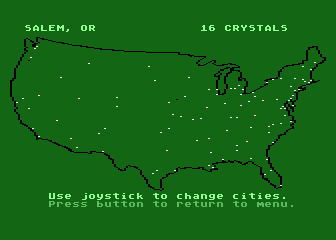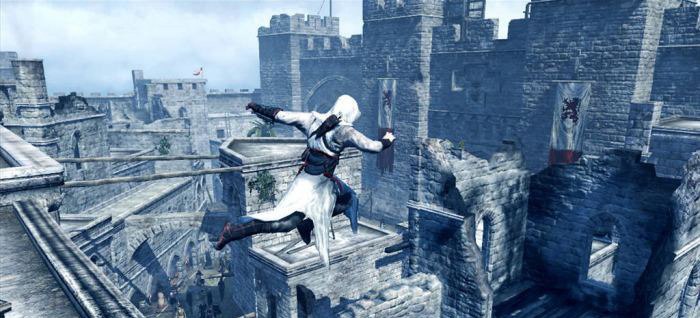2 Learnification Of Gaming Stories
All members of my family are gamers. We play tabletop games, computer games, and card games. We have a lot of fun doing it; we also treat these activities as a great social, family experience.
Here are two stories which can build the context for the learnification of gaming idea.
1. Agent USA.
It is the year 1985. I am 16 years old. My brother has just brought our first computer, a Commodore 64. The first computer game I play is "Agent USA". The goal of the game is to chase a "FuzzBomb" throughout the USA and cure people infected by it. You can travel between cities only via railway; connections between capital cities are provided with fast trains, and among the rest of the cities with normal trains. To win you must move fast, so it is very important to know all capitals and their locations. It is also important to know the relations between cities.
Well; from today's perspective the game is quite miserable; just take a look at a couple of screenshots below. But those days it was a rich multimedia production with a great fun factor.
I had been living in Poland and knew nothing about the geography of United States. But only after a month of playing I learned everything about the main cities of this country: I knew their locations, the relations between them, every state’s capital, and so on.
It was a perfect example of by-the-way learning while playing games, and an example of great learnification of gaming.
2. Trivial Pursuit and Assassin Creed.
It is the year 2009. We are playing with the whole family Trivial Pursuit. My younger daughter, aged 13, draws the question “Where is the Wailing Wall?” and fails to answer. My son, aged 9, tells us that he knows the answer. We ask him and he is right; the Wailing Wall is in Jerusalem. As we haven't been there, we ask him how he knows it. And we hear that he just had been chasing a villain on the Wailing Wall in the Assassin Creed computer game.
I know; this is definitely not a game for him (it is rated PEGI 18). In contrast to the previous game, it is very realistic and brutal (check it below).
But it was amazing for me that my son caught such facts and remembered them. It was another example of by-the-way learning embedded into a computer game.
My Thoughts
There are many serious games which are not only playful, but educative as well. And of course there is another category of games which are not “serious”; they are not created to learn, but for fun. We can, however, design, build, or buy games which, apart from the fun factor, are also equipped with the learning factor.
Let's take a look, for example, at a couple of classic tabletop games.
In Ticket to Ride you build railway connections between cities located in different parts of the world. In Small World, a game created by the same game publishing house, you conquest a fantasy world. When we consider acquiring useful knowledge (and not gaming skills like strategy, building alliances, etc.), which of these two is more educative? In the first one, we by-the-way learn geography; in the second one literally nothing, as the game’s world is virtual.
There are many games with such educative factor (Agricola lets you feel the agricultural challenges; the aforementioned Trivial Pursuit lets you memorize facts, etc.); let’s play this kind of games. Let’s also seek for opportunities of learnification of gaming, by adding to them the learning factor.




